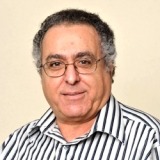Shmuel Muallem, Ph.D.
NIH/NIDCR
Building 10, Room 1N-112
10 Center Dr.
Bethesda, MD 20892
United States
Dr. Muallem’s lab studies epithelial transport, specifically in exocrine physiology, and the regulation of enzymes, fluid, and electrolyte secretion by epithelial cells. One focus is calcium (Ca2+) signaling in glandular cells that secrete digestive enzymes and antibacterial peptides that are essential for control of the oral cavity and gut microbiome. The lab studies the gating mechanism governing plasma membrane Ca2+ channels and its role in inflammatory autoimmune diseases such as pancreatitis and Sjögren's syndrome. His group investigates bicarbonate (HCO3-) transporters in ductal HCO3- secretion, which is vital for the function and health of all secretory glands. Defective regulation of HCO3- secretion occurs in many epithelial diseases including cystic fibrosis, Sjögren's syndrome and pancreatitis. Dr. Muallem’s lab combines electrophysiological and imaging techniques with molecular and biochemical approaches to study the organization of Ca2+ signaling at membrane contact sites and the molecular mechanism of ductal fluid and HCO3- secretion.
Biographical Sketch
Dr. Shmuel Muallem received a Ph.D. from the Weizmann Institute in Israel, where he studied the plasma membrane calcium pump. His post-doctoral work was first at Cambridge University, England and then at University of California, Los Angeles (UCLA), working on calcium signaling and epithelial transport. In 1985, he became an assistant professor at UCLA and in 1988, moved to University of Texas Southwestern Medical Center as an associate professor and then a full professor in 1994. In 2010, Dr. Muallem moved to NIDCR where he continues his work on several aspects of calcium signaling and epithelial transport mechanism as they relate to epithelial function in health and disease.
- Zeng M, Szymczak M, Ahuja M, Zheng C, Yin H, Swaim W, Chiorini JA, Bridges RJ, Muallem S. Restoration of CFTR activity in ducts rescues acinar cell function and reduces inflammation in pancreatic and salivary glands of mice. Gastroenterology. 2017 Oct;153(4):1148-1159. doi: 10.1053/j.gastro.2017.06.011. Epub 2017 Jun 19.
- Ahuja M, Schwartz DM, Tandon M, Son A, Zeng M, Swaim W, Eckhaus M, Hoffman V, Cui Y, Xiao B, Worley PF, Muallem S. Orai1-mediated antimicrobial secretion from pancreatic acini shapes the gut microbiome and regulates gut innate immunity. Cell Metab. 2017 Mar 7;25(3):635-646. doi: 10.1016/j.cmet.2017.02.007.
- Park S, Ahuja M, Kim MS, Brailoiu GC, Jha A, Zeng M, Baydyuk M, Wu LG, Wassif CA, Porter FD, Zerfas PM, Eckhaus MA, Brailoiu E, Shin DM, Muallem S. Fusion of lysosomes with secretory organelles leads to uncontrolled exocytosis in the lysosomal storage disease mucolipidosis type IV. EMBO Rep. 2016 Feb;17(2):266-278. doi: 10.15252/embr.201541542. Epub 2015 Dec 18.
- Shcheynikov N, Son A, Hong JH, Yamazaki O, Ohana E, Kurtz I, Shin DM, Muallem S. Intracellular Cl- as a signaling ion that potently regulates Na+/HCO3- transporters. Proc Natl Acad Sci U S A. 2015 Jan 20;112(3):E329-E337. doi: 10.1073/pnas.1415673112. Epub 2015 Jan 5.
- Maléth J, Choi S, Muallem S, Ahuja M. Translocation between PI(4,5)P2-poor and PI(4,5)P2-rich microdomains during store depletion determines STIM1 conformation and Orai1 gating. Nat Commun. 2014 Dec 17;5:5843. doi: 10.1038/ncomms6843.
- Jha A, Ahuja M, Patel S, Brailoiu E, Muallem S. Convergent regulation of the lysosomal two-pore channel-2 by Mg2+, NAADP, PI(3,5)P2 and multiple protein kinases. EMBO J. 2014 Mar 3;33(5):501-11. doi: 10.1002/embj.201387035. Epub 2014 Feb 5.
- Park S, Shcheynikov N, Hong JH, Zheng C, Suh SH, Kawaai K, Ando H, Mizutani A, Abe T, Kiyonari H, Seki G, Yule D, Mikoshiba K, Muallem S. Irbit Mediates Synergy Between Ca2+ and cAMP Signaling Pathways During Epithelial Transport in Mice. Gastroenterology. 2013 Jul;145(1):232-241. doi: 10.1053/j.gastro.2013.03.047. Epub 2013 Mar 28.
- Hong JH, Yang D, Shcheynikov N, Ohana E, Shin DM, Muallem S. Convergence of IRBIT, phosphatidylinositol (4,5) bisphosphate, and WNK/SPAK kinases in regulation of the Na+-HCO3- cotransporters family. Proc Natl Acad Sci U S A. 2013 Mar 5;110(1):4105-10. doi: 10.1073/pnas.1221410110. Epub 2013 Feb 19.
- Lee MG, Ohana E, Park HW, Yang D, Muallem S. Molecular mechanism of pancreatic and salivary gland fluid and HCO3- secretion. Physiol Rev. 2012 Jan;92(1):39-74. doi: 10.1152/physrev.00011.2011.

